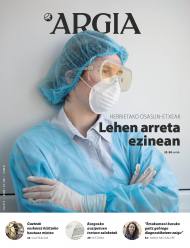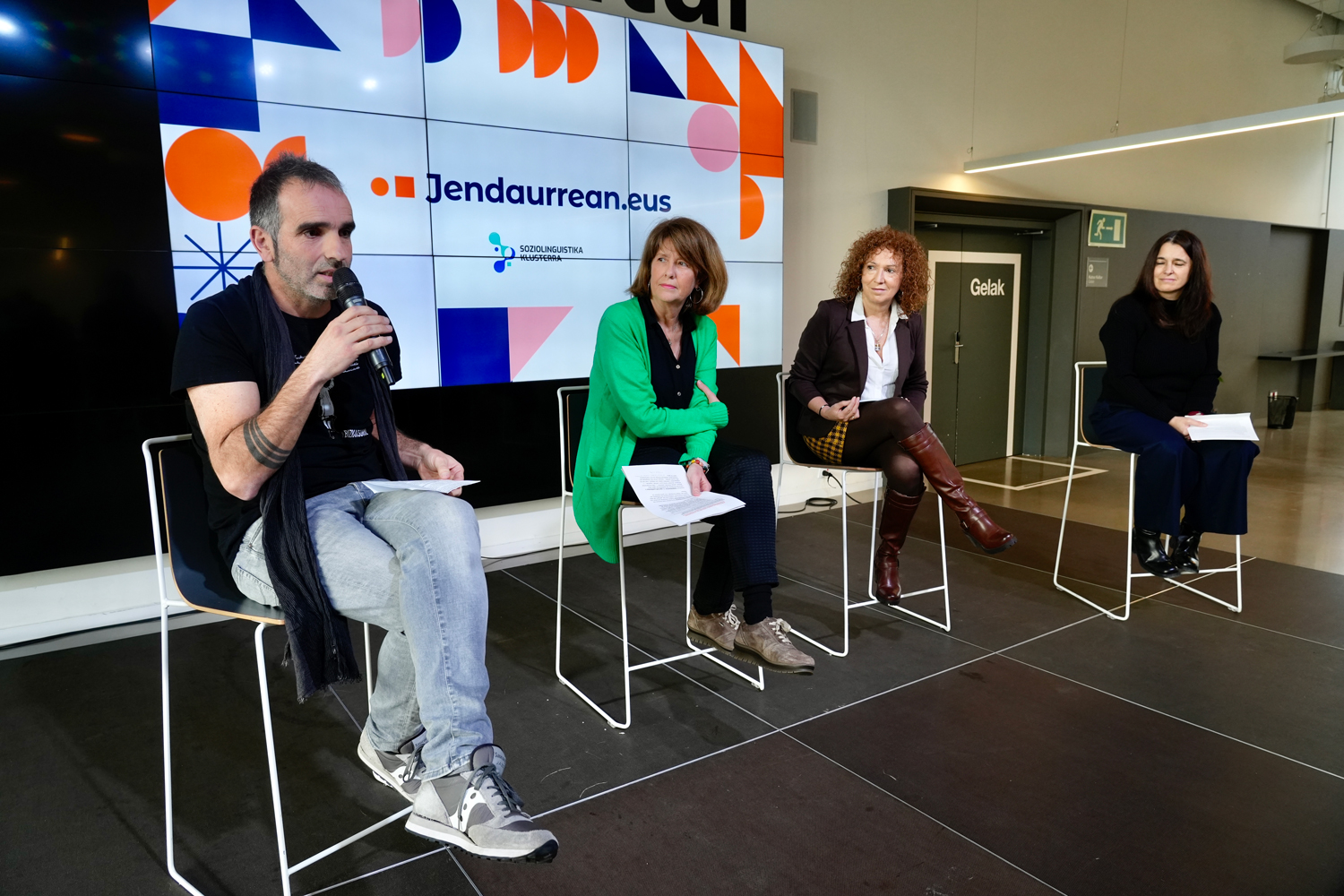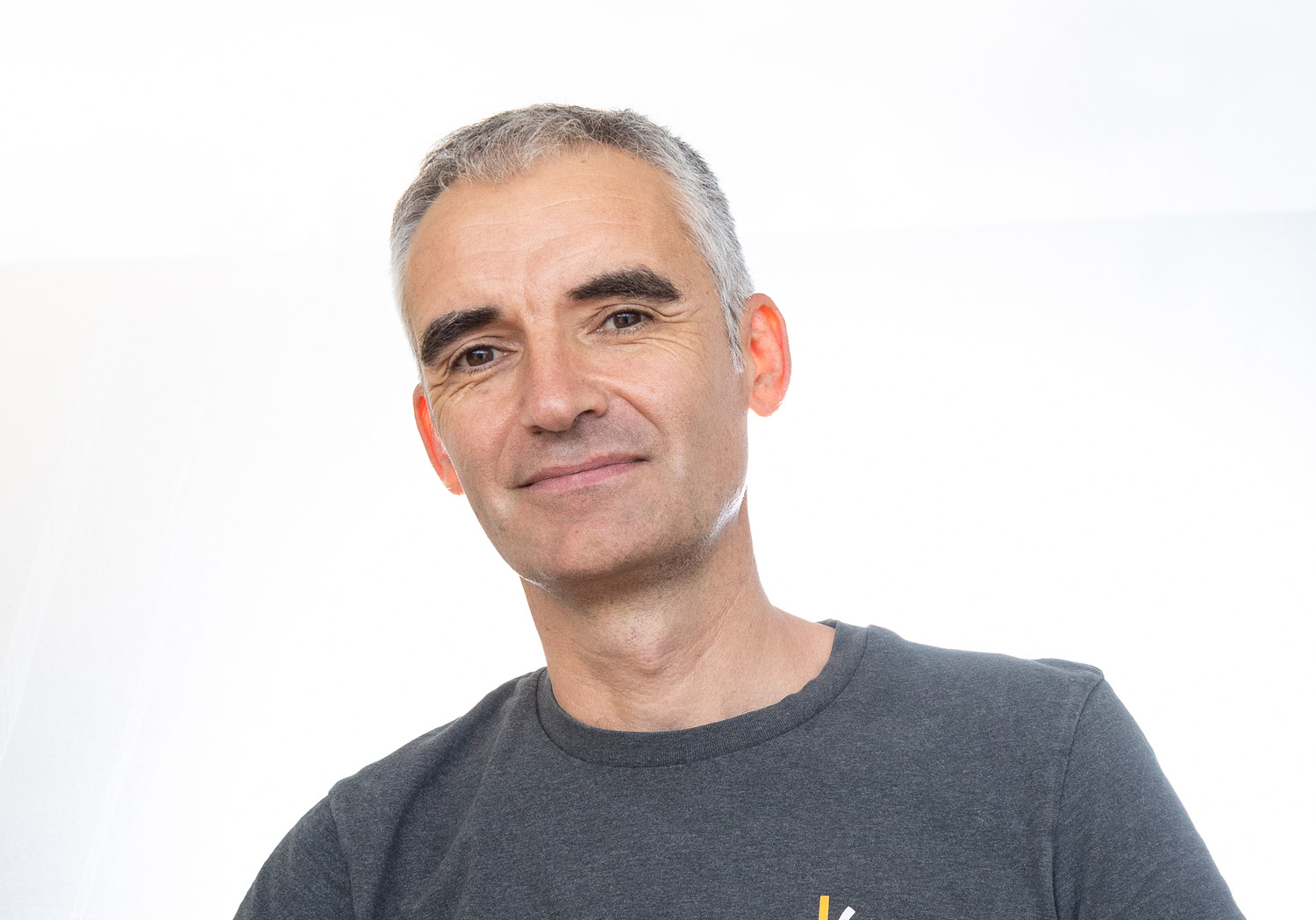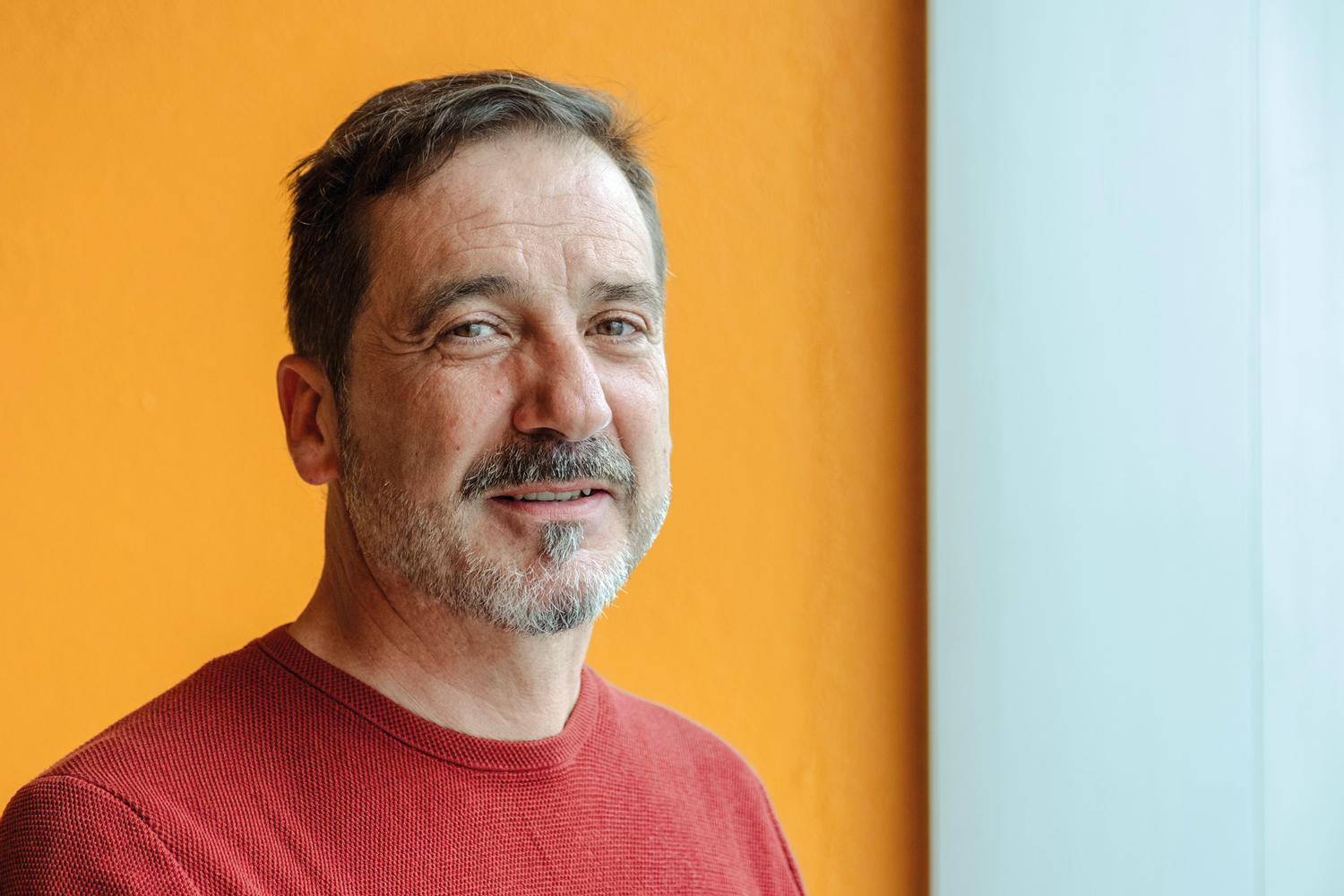Young people want to shake their consciences
- They feel the responsibility behind them. Older generations ask them why they don't speak in Basque. They get angry when they hear it. It is clear that the fate of the young person cannot be to live in a permanent linguistic shock. They want to live in peace, but without giving up their language. In Gaztealdia, nine young people have made an effort to live eight days in Basque. They have not achieved the goal, but they have found many gaps to be able to speak more in Basque. It is about inviting the young people of the Basque Country to live in Euskera.
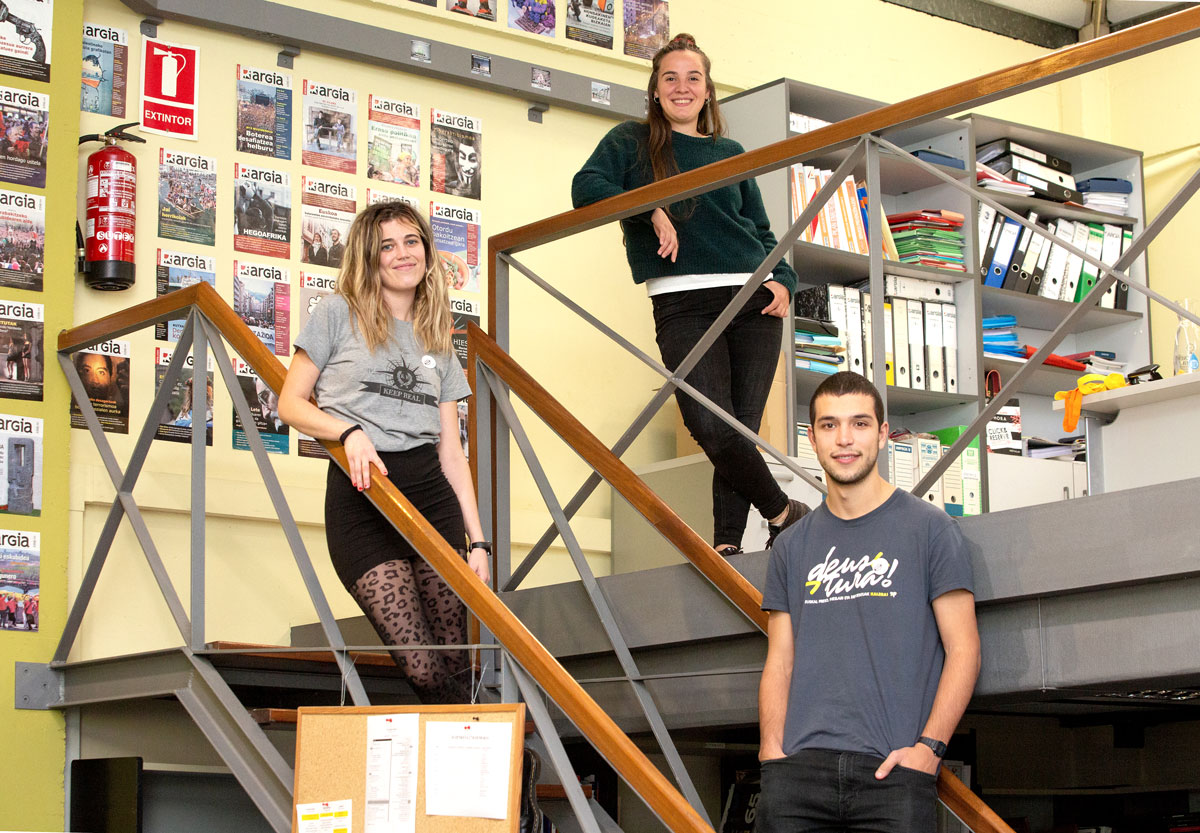
At the round table we have brought together four young people: See Balmaseda Castellano de Tudela, Maialen Arteaga Gonzalez de Zornotza, Andrei Fuchs de Donibane and Mikel Aiartzaguena Agirrebeitia de Bilbao, de Leire Agirre. To begin with, Aiartzaguena has contextualized Gaztealdia and explained how they understand the theme of Euskera. Next, we ask the three people who have participated in Gaztealdia to tell us their experiences.
The nine young people who have participated in Gaztealdia have a network behind them and it is the following agents who are driving the initiative: Topa Gaitezen de Bizkaia, UPNA Basque Group, Iep! The Euskera group of the University of Ibaeta, the Euskera group of the UPV/EHU of Vitoria-Gasteiz, the Euskera group of the School of Students Assembly Bernart Etxepare of Baiona and the young people of the Euskera Bagabiz association of Galdakao.
In the reflection made to us by Aiartzaguren, the objective of young people has been translated into two messages: young people have to talk about the Basque issue by themselves, and the objective is for young people to choose to live in Basque, in other words, they have put the emphasis on use.
In the choice of living in Euskera, the billiard has pointed out two keys. On the one hand, young people have decided to live in Euskera, they're taking the leap for that, but they've come across a paradox. Previous generations have told them that if they make the leap to live in Basque as young people, peoples and communities, they will have at their disposal the means, the possibilities. However, they do not think so: “In the one-week exercise, with a brutal conviction, we have been echoed by the media, supported by society, the participants have expressed the linguistic stress they have experienced. If this has happened in our small hyper-convinced Euskaldun world, how will the collective option of living in Basque society in a natural, free and de-logized way be addressed?” They argue that if the Basque Country is going to be a non-political day, the issue must now be politicised. On many occasions there have been speeches in favour of attractive language, of the need to avoid shocks, of not politicising the Basque country. They disagree. In their trajectory of socialization from adolescence to adulthood, they have studied in which language they develop the main areas: studies, leisure (mainly sports), social networks, internet, television offer, health care, university and the world of work. Aiartzaguena has only considered the studies as areas of use for the Basque country, as many young people study in model D.
By Mikel Aiartzaguren: "This is not about betting on Euskaraldia, but about betting on living in Euskera"
The second issue is to associate Euskera with a country project. Our interlocutor has put forward two questions: Why does someone have to learn Basque? Why does anyone who knows have to do so? He says that in some sectors the answer is easy: because I am Basque and it is my language. The argument of Aiarza is clear that this is not valid for everyone. These young people represent a more comprehensive country project in which there will be no second-class citizens. That is, where no one will feel oppressed for wanting to live in their own language: “Euskera is the best tool we have now to get there. In fact, the fact that Euskera is the language of the first level of citizenship in our country will not mean the disappearance of a language, a nation or a community. The preposition of the Basque to Spanish will not lead to the loss of Spanish. The same applies to French. If you do it the other way around, the Basque will be lost.”
Why on the eve of Euskaraldi and with a similar name?
The Gaztealdia was held from 12 to 19 November, just before the beginning of Euskaraldia and the name of the initiative reminds us of Euskaraldia. There is an intention and the interlocutors are asked. Euskalgintza has joined the institutions to develop the initiative, which in the opinion of these young people gives Euskaraldia a serious, aseptic and institutional image. The young people were afraid to cool down and participate less, as the young people have offered their full support to Euskaraldia. So, to a large extent, they decided to do Euskaraldia to attract young people.

Another reason why Euskaraldia had to be brought forward was this year. They welcome a 15-day social exercise, but considered it more effective to adapt the message to each sector, in this case to the young people, knowing that not all the young people of Euskal Herria have the same characteristics. Aiartzaguena leads thousands of young people who have studied in model D, who know Euskera, who have a positive attitude towards language or at least non-destructive attitudes: “A non-politicized young man, who knows Euskera, would show his willingness to be deaf ears, but the call to participate in the exercise should be more qualitative, not so much to participate in the initiative, but to take the step of living in Euskera.” That is, with the role of ahobizi, you would be able to catch the respiratory areas and the barriers around you, you would try to put the obstacles on the path of being a respiratory zone, and you would help to pray and pray the respiratory zones.
The interlocutor has called for the message to be adapted to young people who wish to do so. In any case, we remind him that in addition to the belarriprest, there was the possibility of playing with the drowning. He replied: “But in the former Euskaraldia we were told that there were too many people in the village and that therefore the exercise was not carried out well. And if you have a point of reason. The scarcity of ears does not favor the contagion effect and the community that may be belarriprest does not participate. All right, but it also makes a corporatist reading, ‘let’s do the exercise well, according to the criteria I have set’.
Maialen Arteaga: "The purpose of the exercise has not been to show a dark photo, but to reflect on where the force should be put"
Aiartzaguena has set the example of the crew of chasing him. Let's suppose that in the pool of the pool he and another have chosen the role of drowning, and that our interlocutor wants to give some message to the other six peers to choose the role. The six can be belarriprest, they are in favor of the Basque. If they play this role, they will do the exercise a hundred percent well. On the contrary, if these six men took the role of ahobizi, they would paw twenty times a day, as they would start speaking in Spanish. Aiartzaguena has multiplied: 20 errors x 6 young x 15 days = 1,800 times exercise in poor condition. As a result, he thinks it's more positive that those people are betting on drowning: “It is not a commitment to Euskaraldia, but to live in Euskera.”
Youth in Tudela, Zornotza and San Juan de Luz
The three young people have lived very different experiences, not for nothing, they live in different socio-linguistic environments, even under an administration. First of all we will go to the Ribera and listen to Miren Balmaseda de Tudela. He's glad he's finished his eight-day business. Happy, but recognizes that it has been very difficult to carry out the exercise: “Many times I have felt at ease and powerless, Tudela is a very castellanized camp.” However, the tudelano has realized that, with the change of language habits, there are spaces to speak in Basque and believes that they must be maintained. As the people know, I knew what I would find in each place, “here I can’t, here neither, here neither,” but the new thing now was that I had to speak in Basque, yes or yes. And he has had good surprises, he has received no rejection, as he hoped to hear more than one “I don’t understand you”. Balmaseda is used to talking about it from a young age. The most uncomfortable situations have been that he himself responds in Basque and the other in Spanish, and that he has to jump to Spanish because the other did not understand anything. But let's have two very good surprises that you remember. On the one hand, in the group where the vasco-speakers and Castilian speakers are, most of the time they speak in Spanish, and knowing that they were exercising, those who have done so in Basque and in the tertulia in Spanish have used words and phrases in Basque. It has received support both in the crew and in general. On the other hand, he has always done so in Spanish with a sister who knows Euskera. In Gaztealdia they have begun to speak in Basque and the aim is to continue like this.
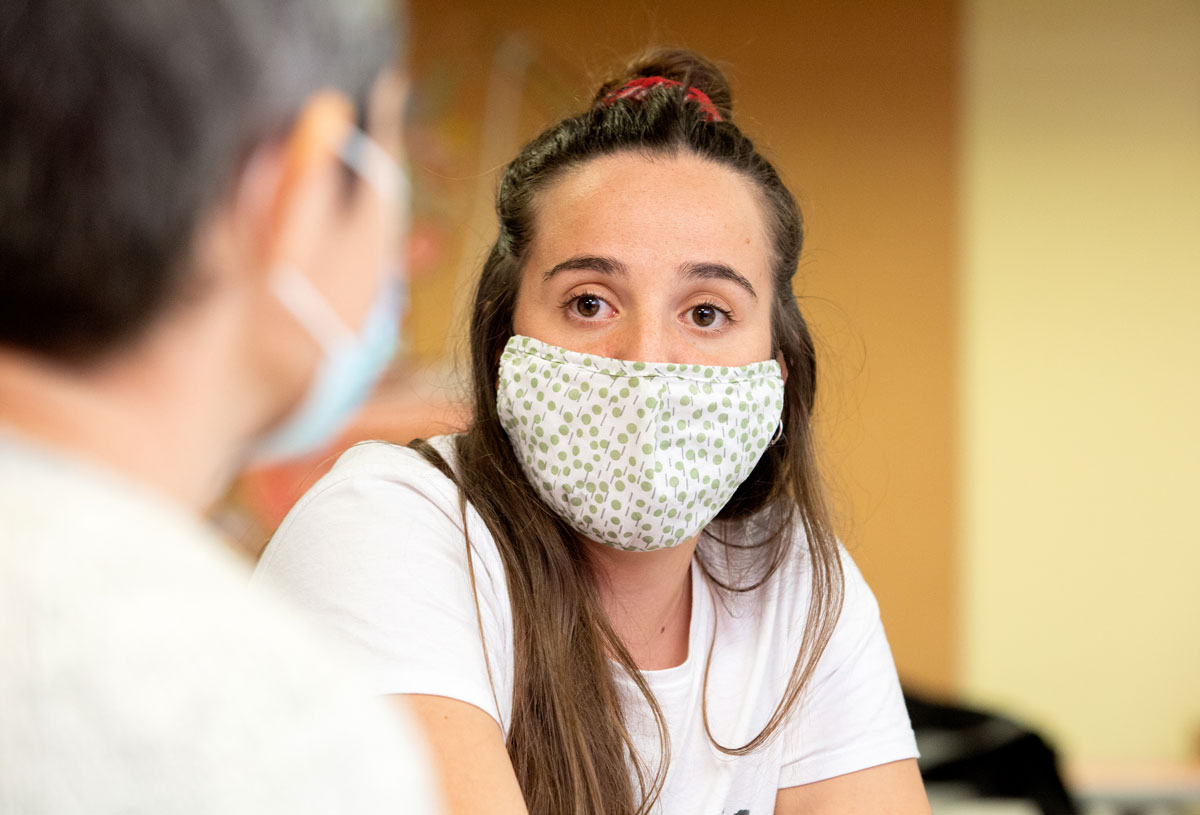
It is clear that the tudelano has also done so in Spanish and we have asked others what it was doing: “The music school teacher doesn’t know Euskera and ‘Good!’ I went on to say ‘Hi, how?’. The teacher doesn't understand it either. I explained the exercise to him. I’ve also told what I was doing to my Castilian speaking friends.” He's tried to have bilingual conversations, but he says that if peers don't understand communication, it's impossible. “It’s one thing to ask for a coffee or a book, but in longer conversations you can’t. In any case, these situations should serve us for reflection: it is always us who change the language, the Basque language is always a secondary language”.
Maialen Arteaga's experience is different. It has a very Euskaldun environment at home, in the crew, at work and in the people. I believed that I lived in Basque and that in Zornotza you can live in Basque. The exercise has taught him that this is not always the case. She has given four examples: she was not aware of the talks in the two languages, she was not aware of the talks in Basque or another in Spanish, she did not even understand Arteaga; she was not accustomed to having to speak continuously in Basque and she realized that she had not had the possibility to dedicate herself exclusively to Basque throughout the day; she noticed that in the group there are jumps in the two languages and now she knows that when she goes. The exercise has served him to reflect: “I thought I lived in Euskera, but that’s not the case. Until the exercise I lived comfortably because I had the option B to do it in Spanish. When I have decided not to do so, there have been clashes.”
The neighbour of Amorebieta-Etxano has referred to the clashes between different agents. In any case, he has made it clear that the aim of the exercise was not to show a dark photo. Through a constructive attitude, they want to reflect on where the force should be put, encourage changes of attitude around the use of the language, change the chip and pollute: “How many things would change if each of us took that attitude and acted among his friends?”

Andrei Fuchs, from Donibane, is very pleased to have done the exercise. At the beginning it became difficult to speak in Euskera, as he knew that walking around Baiona and San Juan de Luz would be difficult to speak in Euskera. He has realized one thing: in more marginal or minority places people were interested and with them he has done more in Basque. Fuchs has not explained to anyone what he was doing in eight days, although, for example, he has entered every day to buy bread in the same bakery: "I didn't want to do it, because otherwise I would have been judged by people in that sense. It seems that I wanted to say ‘I do it in Basque!’. No, I'll come to buy bread every day. I wanted to arouse curiosity. I did it in some places without knowing Euskera, but in others I didn't. It showed that I knew French, that I understood it, but she would see that I, though, spoke Basque. So I know French, but I don’t have to do it in that language.” Of course, he has found the Euskaldunes, and also those who have called for not knowing Euskera the Euskaldun comrade. He has also seen dark ends on the part of those who did not know Euskera; they have almost always given him the excuse: “I have a job.” Among those around him has had achievements. He has managed to translate into Basque conversations in French. After seeing that Fuchs continued to maintain his own, they have naturally resorted to Euskera and have become accustomed to it. He believes that custom is going to be maintained.
The four meetings believe that Youth has brought to light many elements of reflection. As well as moving in the lead, we have asked them whether they can make the next practical initiatives known and have smiled at us in the middle of flight. Aiartzaguena makes a leap from practice to discourse: “We are clear, we want to live in Basque and we want to create resources to live.”
I think it will have to do with the hangover of the profession, but I have to acknowledge that I look at the linguistic landscape of the places I visit. Signs that stick on the walls, hanging from streetlights, billboards, and supports that appear in shops or companies (signs,... [+]









